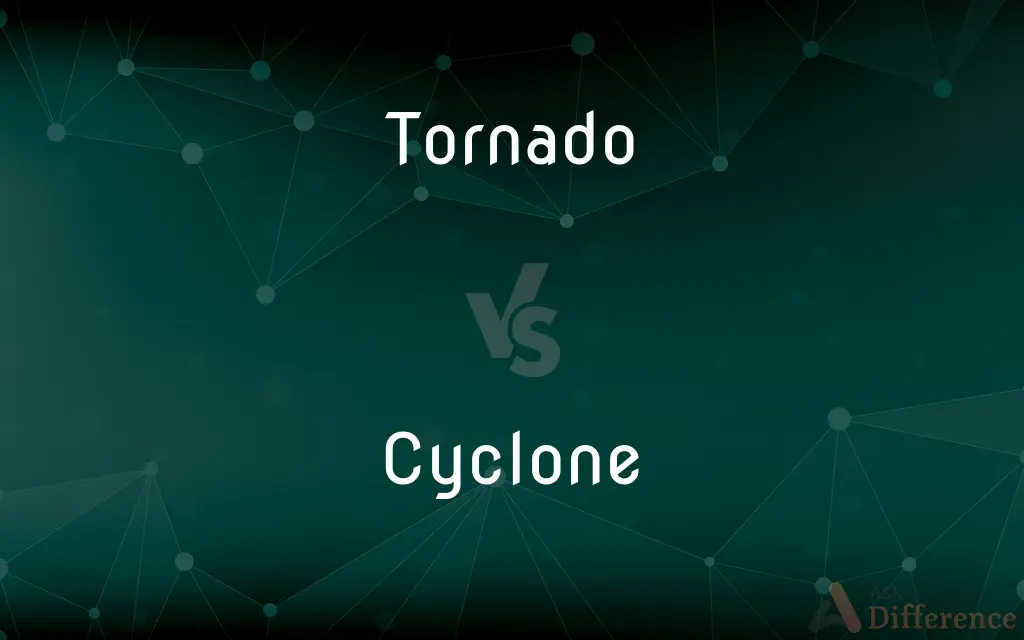Tornado vs. Cyclone — What's the Difference?
Edited by Tayyaba Rehman — By Fiza Rafique — Updated on October 12, 2023
A tornado is a violently rotating column of air extending from a thunderstorm to the ground, while a cyclone is a large, destructive storm that is characterized by strong winds revolving around a moving center.

Difference Between Tornado and Cyclone
Table of Contents
ADVERTISEMENT
Key Differences
Tornadoes and cyclones, while similar in their destructive capacity, differ significantly in terms of their formation, scale, and impact. A tornado, usually over land, originates from thunderstorms and exhibits a visibly extended, funnel-shaped cloud. Whereas a cyclone, forming over warm ocean waters, shows a vast system of winds circulating around a central point, often bringing extensive rainfall and high winds over a large area.
The vortex that characterizes a tornado generally exhibits a narrower, more localized path of destruction and often has a shorter lifespan compared to a cyclone. The latter, cyclones, typically affect a much larger geographical area, potentially impacting entire coastlines and extending effects far inland, providing a more prolonged weather event with its sustained, circulating winds.
Tornadoes typically manifest with remarkable speed and can develop so rapidly that timely warnings are often challenging. Cyclones, conversely, usually provide a bit more warning due to their gradual development over oceanic waters, giving meteorologists the ability to track their progression and predict potential landfall and impact areas.
In terms of safety and precautions, tornadoes often require immediate action, such as seeking shelter in a basement or an interior room of a sturdy building. For cyclones, preparations and evacuations can often be organized in the days leading up to the event, allowing inhabitants of affected areas more time to secure property and move to safer locations.
To summarize, tornadoes are characterized by their swift development, narrow path, and typically shorter duration, all primarily over land. In contrast, cyclones, arising from ocean waters, present larger, more expansive systems, impacting wide geographical regions with their often prolonged and wide-ranging effects.
ADVERTISEMENT
Comparison Chart
Formation
Forms over land, from thunderstorms
Forms over warm ocean waters
Size and Scale
Smaller, localized
Larger, widespread
Duration and Warning
Short-lived, rapid onset
Longer duration, often some warning
Path
Narrow, specific path of damage
Broad, affecting large areas
Associated Weather
Primarily wind damage, brief
Wind, heavy rain, potential flooding, prolonged
Compare with Definitions
Tornado
Tornadoes are characterized by their funnel-shaped cloud.
The tornado swept through the town, leaving destruction in its path.
Cyclone
Cyclones involve broad systems of winds circulating around a central point.
The cyclone brought several days of heavy rain and strong winds.
Tornado
Tornadoes usually develop rapidly, often with little warning.
The tornado developed so swiftly that residents had little time to seek shelter.
Cyclone
Cyclones affect larger geographical areas with their weather impacts.
The cyclone caused widespread flooding across several coastal towns.
Tornado
Tornadoes have a comparatively localized impact.
A tornado can decimate one neighborhood but leave an adjacent one unharmed.
Cyclone
Cyclones often allow for more warning and preparation time.
Meteorologists tracked the cyclone’s path, allowing for early evacuations.
Tornado
Tornadoes are particularly known for their high wind speeds.
The tornado’s fierce winds lifted objects and caused massive damage.
Cyclone
Cyclones form over warm ocean waters.
The cyclone originated in the warm, tropical waters before making landfall.
Tornado
A tornado is a violently rotating column of air that is in contact with both the surface of the Earth and a cumulonimbus cloud or, in rare cases, the base of a cumulus cloud. The windstorm is often referred to as a twister, whirlwind or cyclone, although the word cyclone is used in meteorology to name a weather system with a low-pressure area in the center around which, from an observer looking down toward the surface of the earth, winds blow counterclockwise in the Northern Hemisphere and clockwise in the Southern.
Cyclone
Cyclones can bring about varied weather conditions, including sustained winds, heavy rains, and flooding.
The cyclone inundated the area with several consecutive days of heavy rain and strong winds.
Tornado
A violently rotating column of air extending from a cumulonimbus cloud to the ground, ranging in width from a few meters to more than a kilometer, with destructive winds up to 510 kilometers (316 miles) per hour or higher. Tornadoes are typically associated with a funnel cloud pendant from a storm's wall cloud, often extending to the bottom of the tornado.
Cyclone
In meteorology, a cyclone () is a large scale air mass that rotates around a strong center of low atmospheric pressure, counterclockwise in the Northern Hemisphere and clockwise in the Southern Hemisphere as viewed from above (opposite to an anticyclone). Cyclones are characterized by inward-spiraling winds that rotate about a zone of low pressure.
Tornado
A violent thunderstorm in western Africa or nearby Atlantic waters.
Cyclone
A system of winds rotating inwards to an area of low barometric pressure, with an anticlockwise (northern hemisphere) or clockwise (southern hemisphere) circulation; a depression.
Tornado
A whirlwind or hurricane.
Cyclone
An atmospheric system characterized by the rapid inward circulation of air masses about a low-pressure center, usually accompanied by stormy, often destructive weather. Cyclones circulate counterclockwise in the Northern Hemisphere and clockwise in the Southern Hemisphere.
Tornado
(meteorology) A violent windstorm characterized by a mobile, twisting, funnel-shaped cloud.
A tornado is a rotating column of air.
Cyclone
A violent tropical storm, especially one originating in the southwestern Pacific Ocean or Indian Ocean.
Tornado
A violent whirling wind; specifically (Meteorol.), a tempest distinguished by a rapid whirling and slow progressive motion, usually accompaned with severe thunder, lightning, and torrents of rain, and commonly of short duration and small breadth; a small cyclone.
Cyclone
A violent rotating windstorm, especially a tornado.
Tornado
A localized and violently destructive windstorm occurring over land characterized by a funnel-shaped cloud extending toward the ground
Cyclone
Any of various devices using centrifugal force to separate materials.
Tornado
A purified and potent form of cocaine that is smoked rather than snorted
Cyclone
(broad sense) A weather phenomenon consisting of a system of winds rotating around a center of low atmospheric pressure
Tornado
Tornadoes form predominantly over land.
The plains are often referred to as Tornado Alley due to frequent occurrences.
Cyclone
(narrow sense) Such weather phenomenon occurring in the South Pacific and Indian Ocean
Cyclone
A low pressure system.
Cyclone
(informal) The more or less violent, small-scale circulations such as tornadoes, waterspouts, and dust devils.
Cyclone
A strong wind.
Cyclone
A cyclone separator; the cylindrical vortex tube within such a separator
Cyclone
To separate using a cyclone separator.
Cyclone
To storm as a cyclone.
Cyclone
To whirl in spirals as a result of a cyclone or whirlwind-like force.
Cyclone
To storm wildly; to be in a frenzy.
Cyclone
A violent storm, often of vast extent, characterized by high winds rotating about a calm center of low atmospheric pressure. This center moves onward, often with a velocity of twenty or thirty miles an hour.
Cyclone
In general, a condition of the atmosphere characterized by a central area of pressure much lower than that of surrounding areas, and a system of winds blowing inward and around (clockwise in the southern hemisphere and counter-clockwise in the northern); - called also a low-area storm. It is attended by high temperature, moist air, abundant precipitation, and clouded sky. The term includes the hurricane, typhoon, and tropical storms; it should not be applied to the moderate disturbances attending ordinary areas of low pressure nor to tornadoes, waterspouts, or "twisters," in which the vertical motion is more important than the horizontal.
Cyclone
A tornado. See above, and Tornado.
Cyclone
(meteorology) rapid inward circulation of air masses about a low-pressure center; circling counterclockwise in the northern hemisphere and clockwise in the southern
Cyclone
A violent rotating windstorm
Common Curiosities
Can cyclones bring heavy rain?
Yes, cyclones often bring sustained winds and heavy rainfall.
Are tornadoes associated with thunderstorms?
Yes, tornadoes typically originate from severe thunderstorms.
Is it possible to predict where a cyclone will make landfall?
Yes, meteorologists can often predict cyclone paths and potential landfall areas.
Are tornadoes and cyclones the same?
No, they differ in size, formation, duration, and impacted areas.
Do tornadoes and cyclones form in similar locations?
No, tornadoes primarily form over land while cyclones form over warm ocean waters.
Can tornadoes occur with little warning?
Yes, tornadoes can form and cause damage very rapidly.
Are cyclones typically larger than tornadoes?
Yes, cyclones are larger and can affect wider geographical areas.
Share Your Discovery

Previous Comparison
Electrical vs. Electronics
Next Comparison
Moissanite vs. DiamondAuthor Spotlight
Written by
Fiza RafiqueFiza Rafique is a skilled content writer at AskDifference.com, where she meticulously refines and enhances written pieces. Drawing from her vast editorial expertise, Fiza ensures clarity, accuracy, and precision in every article. Passionate about language, she continually seeks to elevate the quality of content for readers worldwide.
Edited by
Tayyaba RehmanTayyaba Rehman is a distinguished writer, currently serving as a primary contributor to askdifference.com. As a researcher in semantics and etymology, Tayyaba's passion for the complexity of languages and their distinctions has found a perfect home on the platform. Tayyaba delves into the intricacies of language, distinguishing between commonly confused words and phrases, thereby providing clarity for readers worldwide.
















































